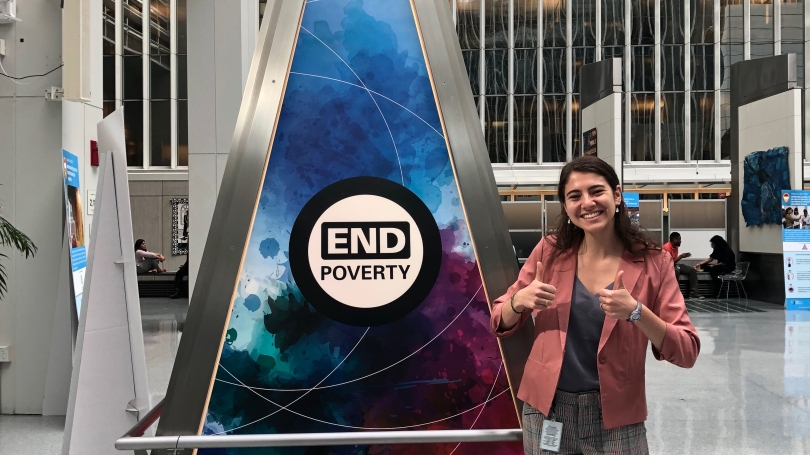
- Public Policy
- Leadership
- Funding
- News & Events
- About the Center
Back to Top Nav
Back to Top Nav
Back to Top Nav
Back to Top Nav
Victoria Meyer '20 interned at the World Bank in the Development Impact Evaluation (DIME) group during the 2018 fall term. The following is an excerpt from her internship report.
This fall, I interned at the World Bank in the Development Impact Evaluation (DIME) group. According to DIME, the group generates high-quality and operationally relevant data and research to transform development policy, help reduce extreme poverty, and secure shared prosperity. It develops customized data and evidence ecosystems to produce actionable information and recommend specific policy pathways to maximize impact.
During my internship, I assisted Economist Caio Piza on research regarding small- and medium-sized enterprises (SMEs) in developing countries. Specifically, I spent six weeks researching different countries’ and multilateral organizations’ policies to support SMEs, the amount of funding that each organization provides to SMEs, the goals and objectives of each organization, and the tools used to support such policy goals. This included researching information online for organizations such as the United Kingdom, the United Nations, and the Inter-American Development Bank, while also organizing and leading phone calls with SME-related representatives from such organizations. The output of this project was a spreadsheet that relayed all my research for DIME that would ultimately help economists adjust their approach to obtain SME-related information from countries and multilateral organizations. Upon completing this research, I helped my boss create a PowerPoint that relayed current SME statistics, discussed problems that SMEs in developing countries face, and suggested ways to tackle such problems. Finally, I created a literature review of scholarly articles for my boss to reference when drafting funding proposals for new projects.
In addition, I attended various lectures and seminars, ranging from an economist’s new mathematical model, new research findings that counter the status quo, and econometric concepts and coding courses I’ve never encountered before. I loved being in an environment where people constantly want to challenge their intellectual understanding of the world. Above all, my internship taught me that I enjoy working in an environment where people want to discuss new, novel ideas and learn from the most current experts in the field.
This internship has affirmed my interest in development economics. Specifically, I enjoyed the culture of continued learning and evidence-based research, and plan to write a thesis and take Real Analysis (Math 35) to make my application for a PhD program in Economics more competitive. Thank you so much to the Rockefeller Center and the Portman Family for providing me with a grant to pursue my passion for development economics during my off-term in Washington, D.C.
The Rockefeller Internships Program has funding for Dartmouth undergraduate students to help defray the cost of living expenses associated with a full-time, unpaid, leave-term internships in the fields of public policy, public affairs, and social entrepreneurship.